Although I had been here many years before, something seemed different. Standing on a slick granite slab, I took in the scene at “Money Drop,” a 30-foot cascade found in an early gorge of the Middle Fork of the Kings River, high in California’s Sierra Nevada. For one of the classic and beloved drops on a river known more for relentless indifference, there didn’t seem to be anything “money” about it. While most media is shot from downstream, giving a glorious “plop and drop” vibe, the in-person scout from above on river-right straightens things right out. Here, the dicey nature of the entrance ledge dominates the view, and a careful stroll to the edge will reveal that the right half of the outflow crashes 20 feet onto a bedrock slab. While trying to remember if it seemed this adversarial the last time I was here, a muffled voice rose over the deafening roar – “Looks chill, I’m going.” I turned and looked up-slope. Shards of jagged sunlight outlined the silhouette of a veteran kayaker, eyes burning with the desire for engagement, and the climber-trained frame to make good on it. It was my 18-year-old son, Alex. It was clear that he didn’t need me anymore. If anything, I could have used some of his resolve.
I knew that father-son relationships are full of such moments. The process of encouraging your child to explore their new world with boldness and learn through failure is the meat and potatoes for many dads. But this time the song was playing in reverse, soundtrack to a feverishly odd father-son picnic. You get the idea – a peaceful community park swapped for a wind-scoured, treacherous river gorge, hot dogs replaced with an empty stomach, badminton traded for Class V multi-day steep creeking, and most profoundly, a reversal of who was the confident one and who needed the pep talk.
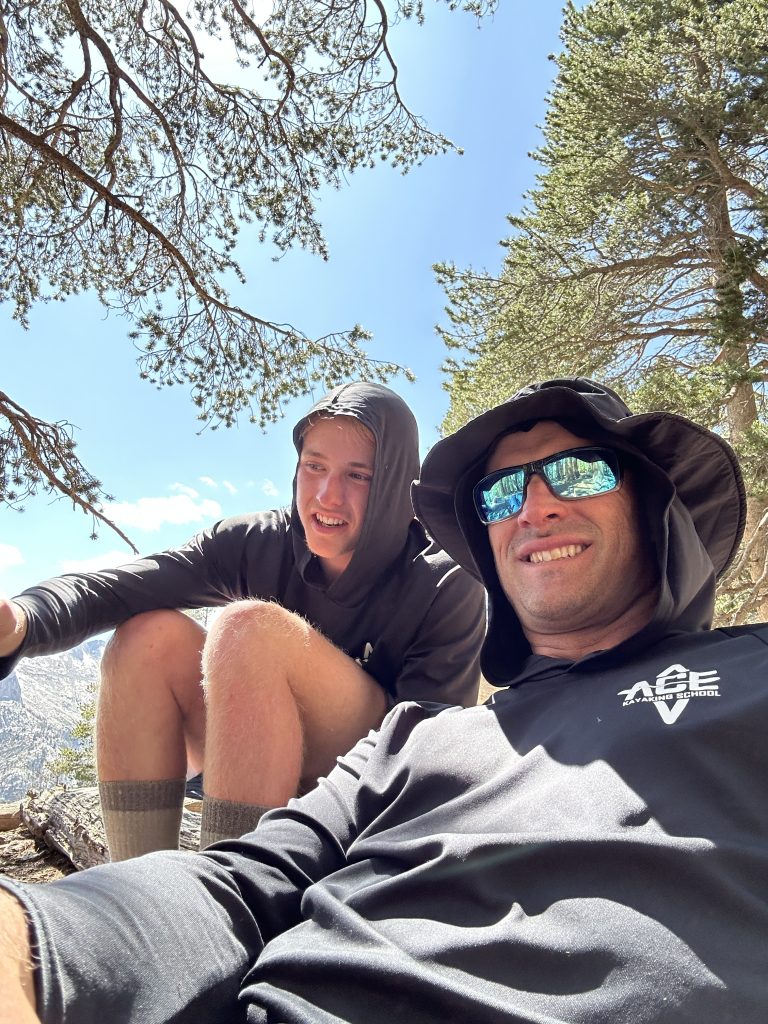
Looking back through 18 years of parenting, I’m not sure we ever actually attended a father-son picnic. Rummaging through memories of engagements of early childhood, from scouts to school functions, cross-country and other extracurriculars, I’m drawing blanks. Once Alex could walk and talk, we were bailing out of Knox County any chance we got, particularly on weekends when these wholesome events probably took place. Perhaps out of selfishness, an understandable desire to maintain sanity as young parents, and the intent to develop Alex’s connection with wild places, my wife Laura and I stole away into the depths of nature, dragging Alex along. Without sanction, we could easily top any organized paternal affair, at least if rambling off-trail, catching snakes, or paddling through river canyons were legitimate brands of “bonding” and “quality time.”
I remember an early trip to the Obed Canyon when Alex was eight-years-old. Submarine is the last rapid of a crux section just upstream of the confluence with Clear Creek. While fairly benign, the sight of the thundering ledge at Submarine seized Alex with anxiety. It was one of countless instances where I ran across the futility one experiences when attempting to talk someone out of an irrational fear. Generally though, through talking, and giving permission to feel what one is feeling, we soldier on. Alex walked that day, and on another trip after, but the next season, after paddling many other rivers, we returned. Alex ran Submarine with little fanfare, stripping the ledge of the power it once held over him.
We still joke about Submarine sometimes, when we’re scouting a stout rapid together – like Money Drop on the Middle Kings. The look in Alex’s eyes, as he waited for my nod to fire it up, jolted me back to the days when I, too, was on a mission to test my limits and find the edge of what was possible.
Thirteen years earlier, I stood where he was, glowing with the same courage. While my crew and I were busy staring the Kings in the eye for a week straight, Alex was dealing in the typical suburban pre-school fare—playdates, time with Grandma, maybe a doctor’s appointment. I was on my annual bro-trip to the West, where we’d fly out with our boats, rent a vehicle, and kayak 10 days straight, manically hitting one hard river after another. When it was too dark for paddling, we drove to the next spot on the list. I was living life as someone who had found the activity I truly loved and had fully committed to. I’ve always enjoyed exploring and having adventures in wild places, and kayaking delivered on those terms in spades. I was particularly intent on running the toughest rivers I could find, following in the footsteps of those who came before and hoping to find myself worthy. Given that, the Middle Kings was an obvious objective, and the certainty of struggle only upped the value. The totality of the experience and the setting in which it took place were unmatched at that point in my paddling career.
The stats on the run blow the doors off most kayaking expeditions. From the South Lake trailhead on the dry and steep eastern slope of the Sierra Nevada, you carry your kayak, paddling gear, and everything you need for the next week 2,200 vertical feet up and over 11,972-foot Bishop Pass into Kings Canyon National Park before dropping another 3,300 knee-jarring feet to the river in LeConte Canyon. The 12 mile hike takes 6-14 hours depending on complications. From there, the river descends 40 miles southwest through gorges and valleys that rival Yosemite in their splendor before opening into the foothills above Pine Flats Reservoir, east of Fresno. Over this distance, the river drops more gradient in a single, paddleable push, potentially more than any other in the world—some 7,400 feet. The steep, low-volume creek gradually accretes more flow each day, evolving into a relentlessly pushy, complex river. The Kings is the ultimate multi-day creeking expedition. Running a perfect group size of four on my first trip in 2012, we took a week to descend the river, emerging totally haggard and drunk on the power of an experience that awarded great glory to those willing to suffer and give everything they had. At that moment, it was a career highlight.
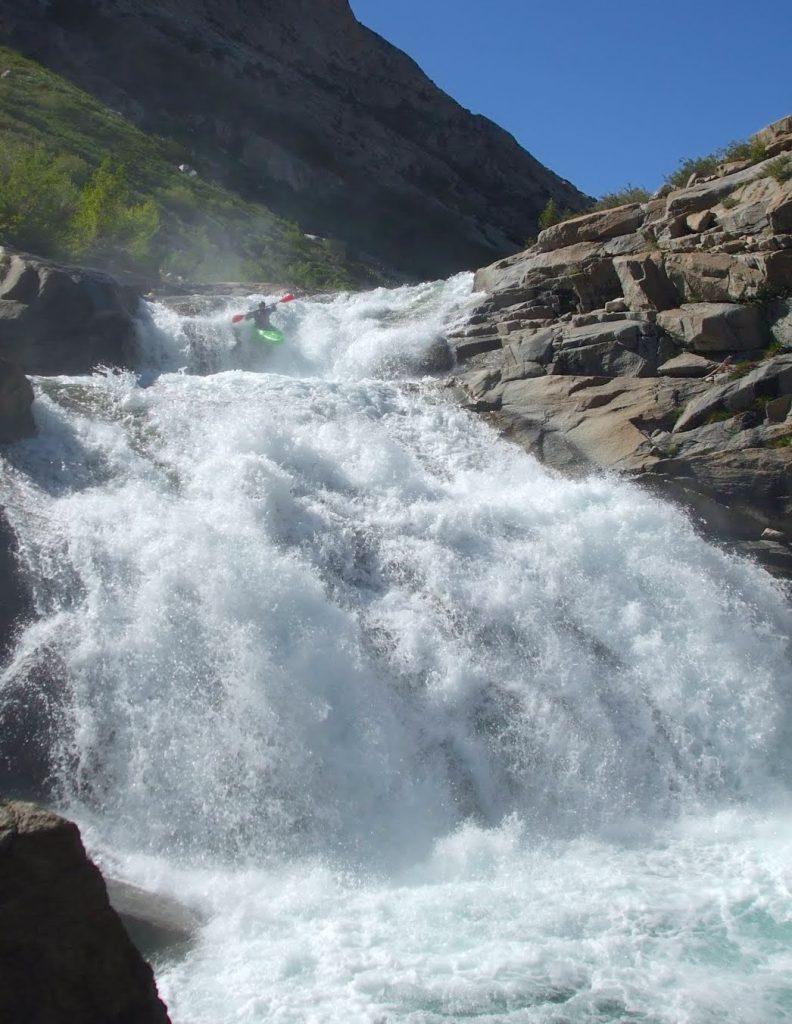
I returned from my first trip to the Kings and told Alex all about it. At 5 years old, he had already spent a few years on the river and was a year into learning how to paddle his first playboat. Even at his young age, he was obsessed with kayaking, and he believed me when I told him that the Middle Kings was the pinnacle, the ultimate river. I planted the seed.
Having a child and raising them on the river gives lucky parents an opportunity to live it all over again, from the very beginning. Instead of direct personal exploration, though, you’re fostering someone else’s journey down a road you walked long ago. Upon starting Alex on the river, Laura and I found ourselves back at the old haunts, the Hiwassee, Clear Fork, Tuckasegee, and Chattooga, experiencing them anew through Alex’s eyes.
We missed so much magic the first time around. Waking to early morning fog on a beach halfway down the Chattooga, catching salamanders in the Smokies, or jumping off a boulder into Clear Creek seemed more profound than ever. Beholding his experience added dimension to our own, and the perspective from coming full circle deepened the meaning of everyday moments on and off the river. Those early days on the river seemed, at the time, like they were forever. Time can move a bit slowly when raising a child, no matter how much fun you’re having, but over several years, we started to get the distinct impression that Alex was growing up. Not just in size but also in personality and willfulness, Alex was becoming a man. And his appetite for paddling exploded. Being a full-time guide and instructor, I certainly wasn’t slowing down, but my commitment to chasing hard whitewater waned a little each season. As Alex focused more on progressing his paddling game, we quickly moved to the harder southern rivers. As his skills ballooned, we had some pretty rad father-son experiences. Wild self-shuttles, hike up runs, overnighters, and first descents were all in the mix. Alex first paddled the Green Narrows at 12 years old, followed by his first run down the Linville Gorge a year later. By the time he had his learner’s permit, he had run most of the hardest rivers in the South and was crushing it on family trips out West, hitting classic hard runs in the Pacific Northwest.
Paddling friends and family regularly asked if we were nervous that Alex was paddling such high-end whitewater. We also knew many parents who had introduced their kids to paddling, but upon seeing them get into more serious water, tried to pump the brakes. The reality was that because he started so young and paddled so frequently, Alex had more days on the water and a more thorough foundation for what he was doing than most. And while the pre-frontal cortex—that part of the brain wired to avoid calamity at every corner—is not fully developed until roughly 25, Alex also seemed smart about how he operated on the river. We were proud of him and weren’t particularly worried.
Though my hunger to drink from the firehose was fading, Alex’s drive extended my time on hard water. He wanted to have these experiences, and we were responsible for his actions and the consequences that came with them. The thought of him being out on these rivers with someone else was something that gave me pause. Luckily, I had all the gear and experience to tag along, so I did my best to keep up. For example, I had grown weary of the steady drip of nerves that slips into one’s life every October as the Green Race approaches. I hadn’t raced in over 10 years, but how could I miss experiencing such a magical moment with my son? In 2022, he pulled me out of retirement for his first race, and it was like Christmas in November. We were constantly having these amazing father-son adventures, and I felt like the luckiest dad on Earth.
A decade after conquering his fears at Submarine on the Obed, Alex was ready for a proper tear in the Sierras. We drove out and hit runs like Big Kimshew Creek, Bald Rock Canyon, 49 to Bridgeport, and Golden Gate. We also enjoyed his first multi-day run out of a creek boat on Devils Canyon of the Middle Feather. At this point, I knew he was ready for the Kings, and we made plans for the upcoming 2024 season. That year, I was sidelined with a shoulder injury. When the stars finally aligned in 2025, we found ourselves drifting to sleep in the parking lot at the Bishop Pass Trailhead, under cold, brilliant skies.
I woke up around four a.m. to Alex loading and installing his carrying system for his boat. It was cold and dark. I told him to take his time and be safe before rolling over and sleeping another two hours. Alex was getting an early start as he sought the purity of carrying all his own stuff, boat and all, over the pass. While I also carried everything I needed over Bishop Pass the first time I ran the river in 2012, others in the group were using porters this time. They would only carry their kayaks and the food and water needed for the hike, and the porters would carry everything else and deliver it to the river that evening. No longer having anything to prove, and having noticed the sensations of an aging body between the last trip and this one, I decided that a few hundred dollars was worth lightening my load by 30 pounds.
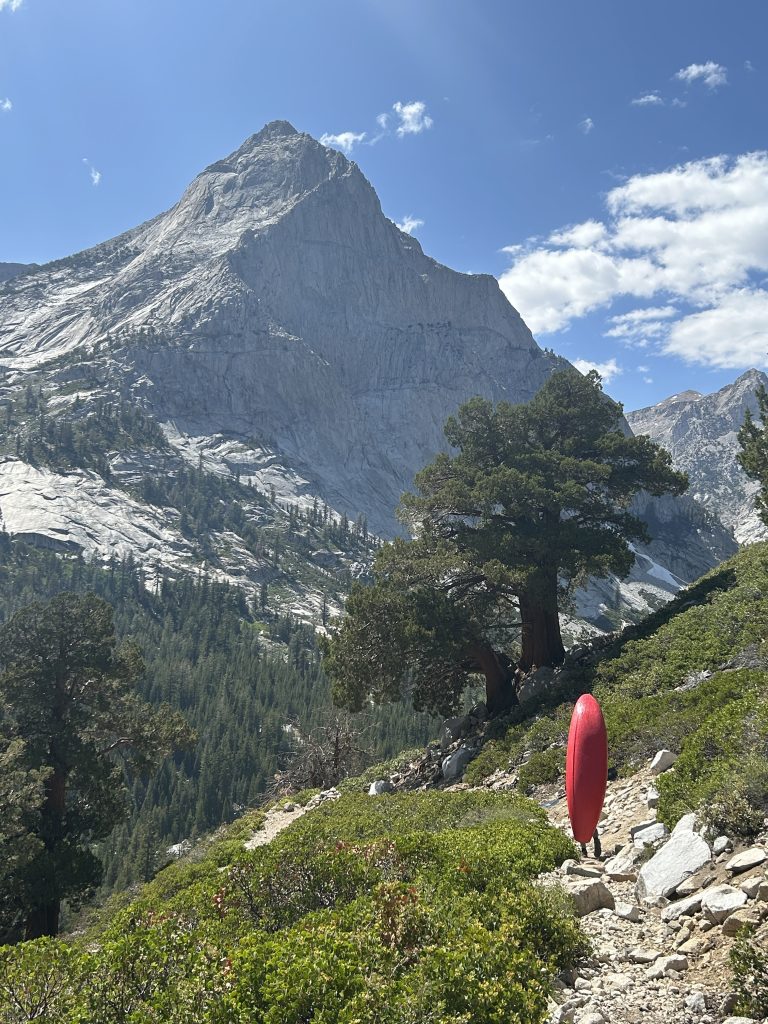
Hiking in. Photo Kirk Eddlemon.
As the miles passed, the group spread out, so I mostly had my own thoughts as company on the first five miles up Bishop Pass. After a few hours, I spotted the pass itself, and on one of the upper switchbacks, 1,000 vertical feet above me, I saw the pointy tip of a kayak, Dagger red, climbing upwards. In that moment, I felt deep waves of gratitude and pride in the man Alex had become. Just a few weeks before, he had graduated high school with highest honors and received a full scholarship for engineering at UT Knoxville. He was a more dedicated climber than paddler at this point, and yet he was still able to pick up the boat and commit to the most intense river available this side of scanning a passport. He had turned into an awesome human in general, and it was so cool to see him in his element. A few hours after I topped out over the pass, I rounded a corner to find him resting in the shade of an ancient foxtail pine, located halfway down the brink of a glacially carved, granite canyon where the waters of the Middle Fork waited.
We took a long rest and drank lots of water, enjoying a final break before we’d shlep our stuff a few more miles and some 1,200 vertical feet down to the river. Alex asked if we were the first father-son team to paddle the Middle Kings. I said I wasn’t sure, but it seemed likely. At that moment, I realized that, unlike most of the other father-son trips we had done together up until this point, Alex didn’t really need me this time. Everything he needed he had with him, whether in his boat, his mind, or his heart. I was no longer facilitating. I was just there. We were teammates now.
Watching Alex share duties with the group, rotating out onto the sharp end when boat scouting through Class V boulder gardens, helping pass boats on a portage, or giving river signals and making executive calls on the group’s behalf when time mattered made me so proud. When you tell your crew something is good to go, there’s a sense of responsibility there. The judgment required to decide whether something is worth a look, is routable on verbal beta, or whether it should just be a walk, is critical. He had developed all the skills and held up his end of the bargain. I saw myself in this process, knowing that I had trained him extensively on the mentality and skills required to stay safe and move downstream smoothly.
What I hadn’t taught him was his paddling style. As a strong adherent to the notion of letting the water work for you, I tend to pick lines where the water supplies the energy. It’s my job to channel and refine that energy to my own ends, and while bursts of speed are necessary here and there, flow state is achieved with patience and suggestibility. While Alex grew up paddling with me and certainly developed under that philosophy, what astonished me was that he had used my approach as a platform upon which to build his own style. Alex’s dedication to health and physical training at a young age, and his ability to apply an intensity of mind to whatever he gives his attention to, allowed him to take the foundation I had laid out and run with it. I witnessed him take authorship over how he operates. He chose lines that were buttery smooth in nature, using the full flow of the river, but executed them with an amount of power, speed, and precision I had never fathomed.
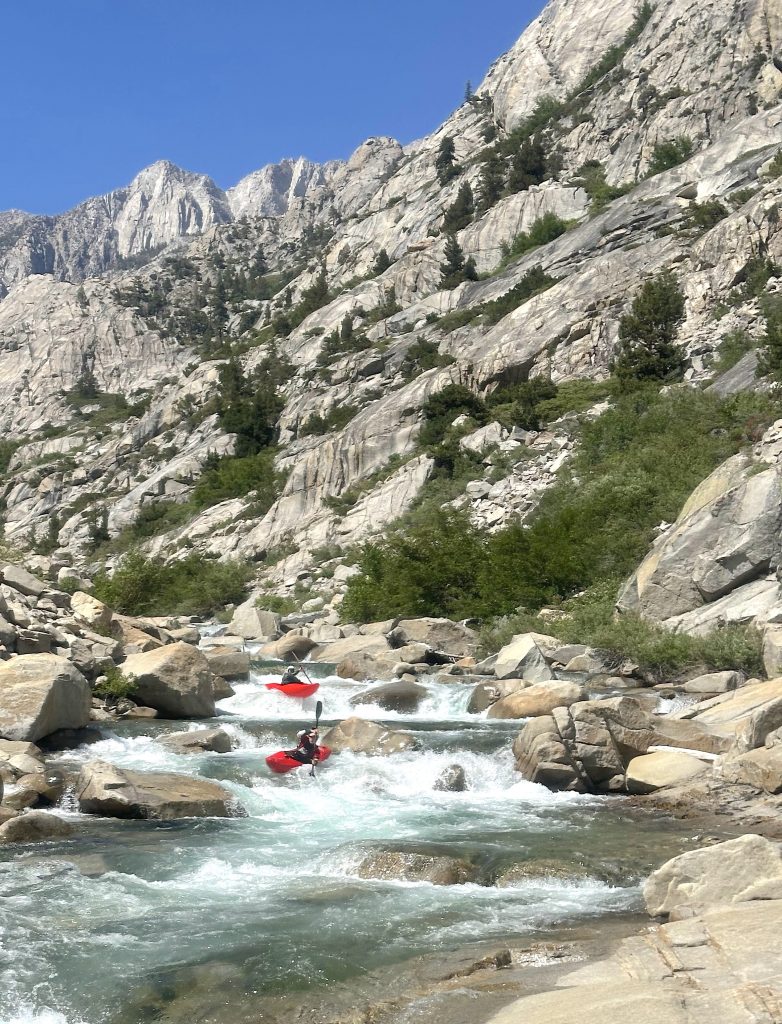
Father and son creeking through the upper reaches of the Kings. Photo Gabe Newton.
The days on the Kings are long and hard. It’s high-pressure sun up to sun down, and the degree of constant focus and care required to move downstream in a sustainable way consumes your full existence. It’s a glorious environment within which to operate, and though we were all business much of every day, when taking a break, or exploring from camp, I often found myself steeped in wonder that here we were, my son and I, paddling the Middle Kings together, and how beautiful it was. The universe had dealt us a one-off experience, and I found myself reveling as a seamless part of the great circle, ecstatic to have had such a formative experience alongside my son, Alex. He’s a better, stronger paddler than I am now, and has been for a little while. I’m so grateful that I was able to ride along on his trip down this special river, as we temporarily overlapped in a dual state of ascendance and descendance. And within that, I was able to witness his own style emerging, taking what he started with and creatively expanding it into his own way of being.
Would I recommend that every dad try to kayak the Middle Kings with their kid? I don’t know. It sounded like a pipe dream when I first considered the possibility, fraught with lots of needless risk and discomfort. Whitewater is a strange phenomenon to make central to one’s life, mostly unknown and unheeded in a world that prioritizes safety and comfort above all else. But if something is worth doing, it’s worth doing right, and with full heart and commitment. And whether it’s fishing, throwing the frisbee, going to a father-son picnic, or running the Middle Kings, there’s a lot to gain from being there day in and day out, to watch them grow into their own person. If you give them everything you can, they’ll probably drag you down some rivers you thought were long ago in the rearview. Full circle.
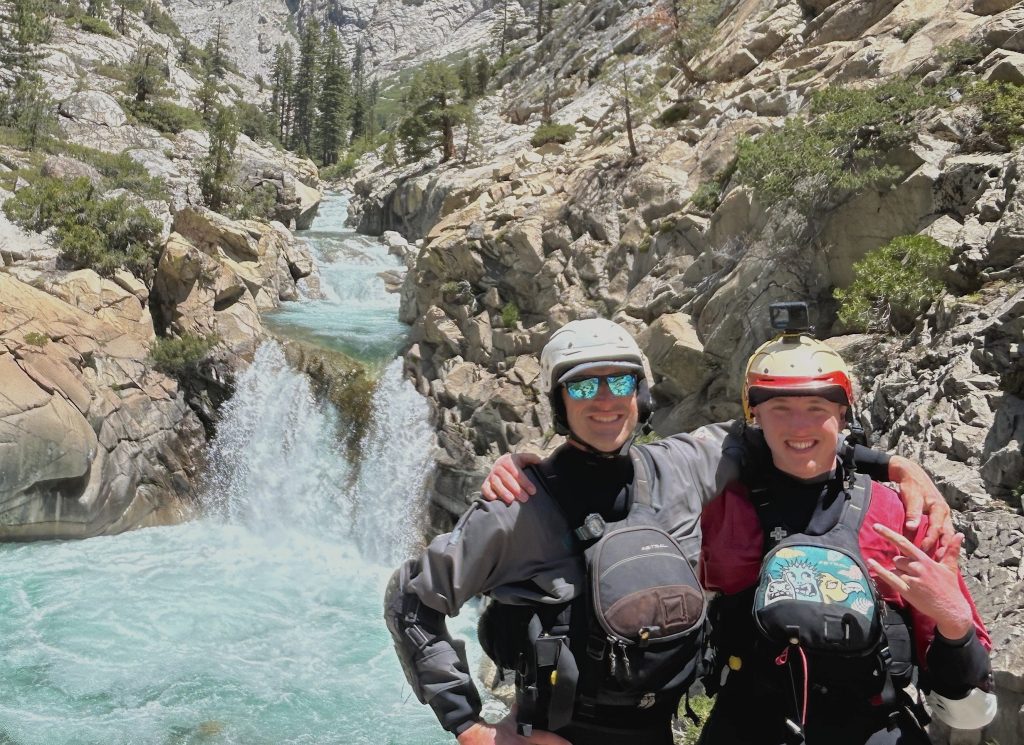
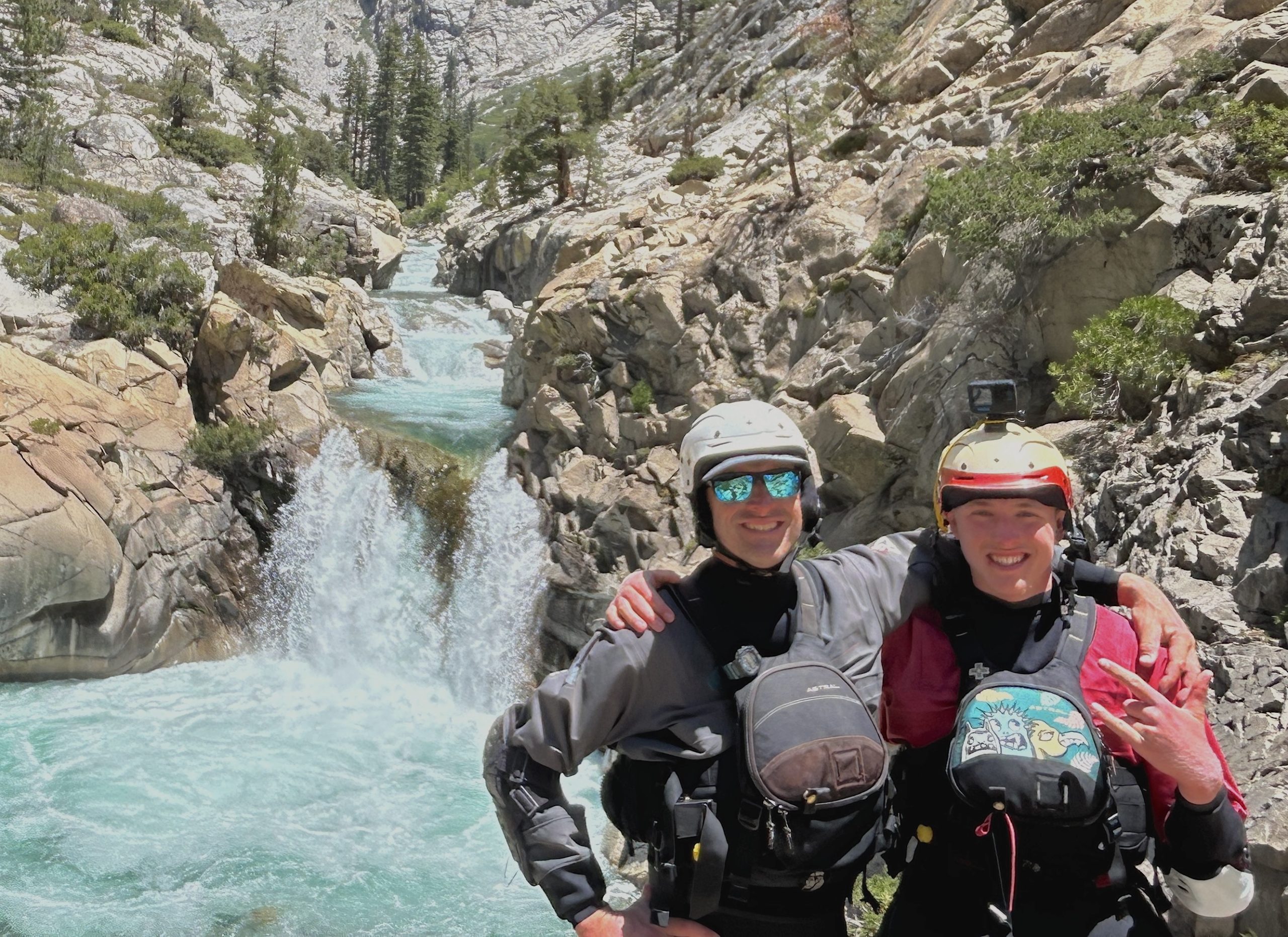
Leave a Reply